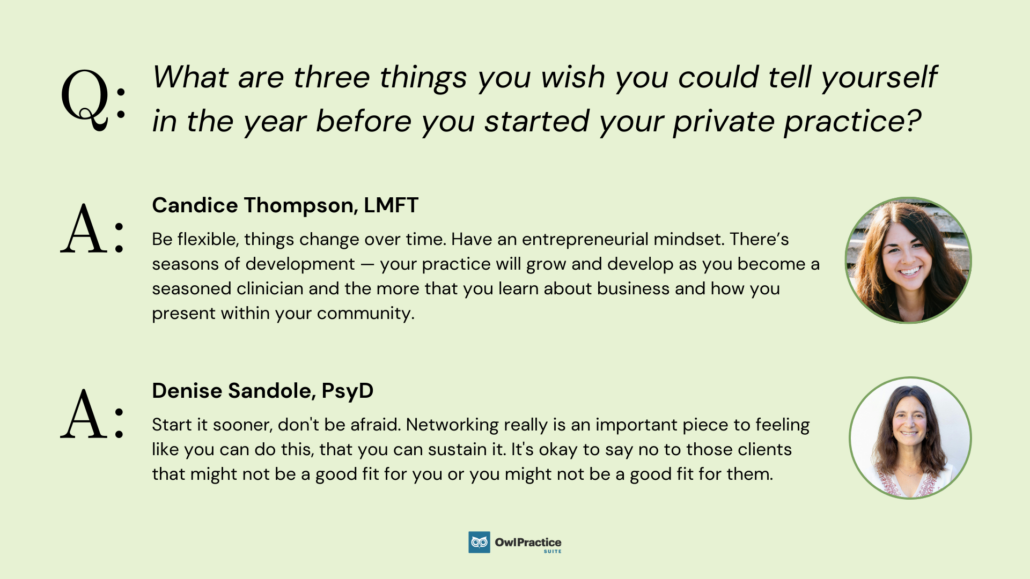
What are three things you wish you could tell yourself in the year before you started your private practice?
Candice: What I will say is that I am a low-risk, risk-type of business person. I have always thought about making choices that I could still be financially sustainable in the process. When I started my practice, I had a full-time clinical job with a nonprofit, and I started one day a week on the weekends. That’s just evolved over time. The more clients I got, the less time I worked at the nonprofit until I was able to be full-time in my private practice.
A few things that I learned along the way is, one is just that flexibility, that things change over time. When I started, tech was not a part of the process at all. I remember when a colleague of mine was going to use an iPad for art therapy, and that was so out there and mind-blowing at the time. Now, COVID has happened, a lot of things are remote, and there’s a whole new mental health tech industry that has gotten involved. I know we’ll talk about that more along the way.
A couple of other things I wish I knew early on was just to have an entrepreneurial mindset. I think that’s not something that we ever get trained in in our graduate opportunities. Of course, when we’re hitting our hours, we mostly work for free or really low pay. There’s this need, if you’re going to start a private practice, all of a sudden, I need to understand business and branding. That’s something early on, I wish that I sought information like this to learn that business side of things.
The other thing, to that, I think that with everything else in life, there’s seasons of development. Your practice will grow and develop as you become a seasoned clinician and the more that you learn about business and how you present within your community, the relationships that you build, and the areas of focus that you develop, which I think just take some time.

Denise: I love this question. I love being able to go back in time, revisit things that we could have done. Three pieces of advice I would say to myself. Number one, start it sooner. Don’t be afraid. I feel like we linger so long in that contemplative phase. Should I start it? Can I start it? Will it be successful? Like Megan just said, you will figure it out. I started my private practice during the pandemic. It has remained virtual only. It’s doing well. I wish I had started it sooner. That’s one piece of advice: push through that fear and just go for it.
The second thing is, speaking to what Candice spoke of, we don’t have a business degree, most of us. Networking really is an important piece to feeling like you can do this, that you can sustain it. For me, it was networking to find a really good psychiatrist to have on speed dial because so many of my patients may need, will need the combined treatment of therapy and medication. That also gives peace of mind knowing you have “psychiatrist so-and-so” on speed dial for when you have that patient who needs some medication.
The third thing I would tell myself is, when you’re first starting out, you’re so eager, you’re nervous. “Am I going to have a business, a sustainable business?” You might be saying yes to every single client that comes your way. It’s okay to say no to those clients that might not be a good fit for you or you might not be a good fit for them. Looking at your total caseload, you should slot out. I probably shouldn’t have too many personality disorders on my caseload if I’m going to be doing this for a certain amount of time. For me, I’m part-time. Things like that, it’s okay to say no sometimes, but have that network so then you can make those appropriate referrals to folks so you’re giving them other options.
Read more about the panelists and where to follow them here: Power to the Private Practice: Finding Your Best Path to Private Practice.
Read Part 2 and more below:
- Part 2: Let’s talk about insurance vs. private pay — how did you decide, and what tools or information helped you make that decision?
- Part 3: How did you decide between using platforms like Alma and Headway vs. going completely independent? What are the trade-offs?
- Part 4: How do you…pay taxes? Do market research? Brand yourself? Stay on top of bookkeeping?
- Part 5: How do you continue to stay informed and have a support network to help answer questions and navigate private practice after you are up and running?
- Part 6: Webinar Attendee Submitted Questions, and General Q&A

Start a Free Trial!
Reduce clinical administrative tasks and transform more lives with Owl Practice. Owl Practice provides all the tools you need to make your practice successful. Join the thousands of care professionals using Owl to run their practice every day.



